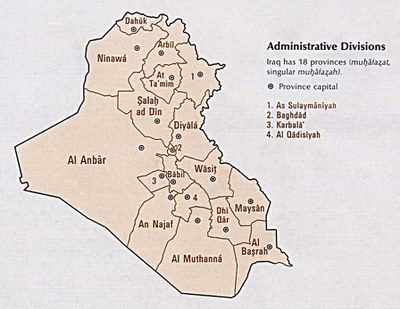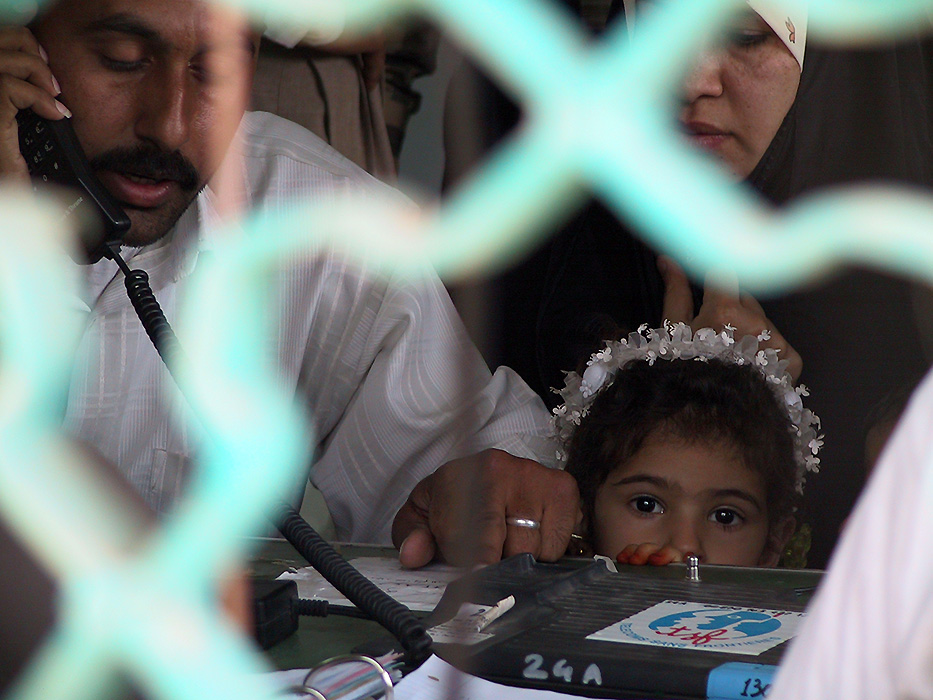War in Iraq
Contexte : Population displacement
Date de début : 16/04/2003
Date de fin : 26/09/2003
Zones d’intervention :
- Baghdad
- Baquba (Djala Province)
- Hillah (Babylone Province)
- Kerbala (Kerbala Province)
- Ar Rutbah (Anbar Province)
- Samarra (Salah al Din Province)
- Kut (Wasit Province)
- Diwaniya (Al Qadissiya Province)
- Mahmoudia (Bagdad Province)
Activités :
- Telecom centres
- Radio support
- Humanitarian calling operations
- Family reunification
82 beneficiary organisations
502 Internet connections
5 817 MB of data exchanged
135 days of telephony operations
9 734 calls abroad offered
116 588 beneficiaries of calls
Context
In February-March 2003, the United States and its allies launched operations on strategic targets across Iraq. In Baghdad, the Ministry of Telecommunications was among the first affected. The fixed telephone networks, whose operability was already unstable before the conflict, were destroyed and no longer worked in 15 of the 18 Iraqi regions. In addition, the power grid had been heavily damaged over a large part of the country, which prevented the use of the mobile telecommunications network.
Iraqis could no longer make local, national or international calls, and were isolated from the rest of the world. However, there was a substantial demand from the population to call abroad. In addition, there were significant requests for telecommunications from relief agencies and in particular, local organisations.
Deployment
Télécoms sans Frontières closely monitored events and therefore made the decision to intervene in Iraq to open telecommunication centres to provide solutions to the communication problems that had been identified.
With the support of the European Civil Protection and Humanitarian Aid Operations (ECHO), three TSF teams deployed in Amman, Jordan for a logistics preparation phase. Then they joined the Iraqi town of Ar Rutbah on April 24 before reaching Baghdad on April 28.

Telecoms Centres
TSF joined Baghdad where, with logistical support from the International Federation of Red Cross and Red Crescent Societies, it opened a telecoms centre for NGOs and the population. Initially located in Al Mansur district, the telecom centre was transferred on June 15 to the premises of the NGO Coordination Committee in Iraq (NCCI), in the district of the University of Technology.
The centre had long been the only public access to the Internet. It offered NGOs satellite internet connections and the following services:
- email service and permanent Internet connection;
- satellite telephone lines;
- fax;
- radio technical assistance (frequency programming, relay installation, etc.);
- high quality videoconferencing service;
- complete office equipment (laptops, office software, printers, scanners, CD burners);
- temporary loan service of satellite telephones (for assessment missions for example);
- permanent technical assistance by qualified personnel and possibility to programme the computers of NGOs to connect them to the network;
- Equipment loan.
The NGO centre was often the only link with the outside world for small NGOs that were not equipped with telecommunications. Several larger NGOs have turned to the TSF centre for their larger file transfers.
The services offered by TSF ensured better coordination between organisations, their headquarters and their partners, as well as stronger security.
Thanks to this technical support, associations such as CARE, Médecins du Monde, ATLAS Logistics, HELP AGE International, Première Urgence, Handicap International and the French Red Cross coordinate their activities more effectively. Every day, fifteen NGOs on average used the support of TSF. As part of this project, TSF supported more than 80 organisations in total.
Faced with the growing number of security incidents and in particular actions targeting civilians and humanitarian personnel, TSF decided to end its telecom centre activity on 26th September.
Radio support
Radio activity was particularly important during this project as it was essential to be able to follow the movements of personnel at any time and thus ensure their safety. Given the country's state of instability, it was vital for the NGOs to equip themselves with VHF radio and the work of the radio technician at TSF was essential.
The radio activity was carried out in collaboration with the FITTEST team (Fast Information Technology and Telecommunications Emergency and Support Team) of the United Nations, with TSF being in charge of all requests from NGOs:
- More than 75 radio interventions took place, including several heavy installations;
- 35 NGOs used the UN frequency, 29 of which were supported by the radio TSF technician;
- 140 handsets were programmed by the TSF radio technician (UN channels, NGO channels).
Humanitarian Calling Operations
Upon arrival in the city of Ar Rutbah, TSF conducted telephone operations that enabled the population to reconnect with their relatives abroad.
Following the opening of the telecom centre in Baghdad, operations for the population were held there in the afternoons. To enable people, hospitals and humanitarian organisations to benefit from these same services, mobile teams with mobile satellite equipment traveled the country to areas where needs were identified as most urgent.
A total of 24 telephone operation centres were installed in Baghdad and 6 in different cities across the country. These clusters ranged in duration from 3 to 12 days and were generally open from 9 am to 2 pm, with the chosen the timeframe offering the most security and the best working conditions for the beneficiaries. Each of these centres offered an average of 80 calls, with some reaching more than 200 calls during the day.
This service was aimed primarily at the most vulnerable and underprivileged populations. For the vast majority, the calls were routed to Kuwait, the United States, Germany, Jordan, Syria and the United Arab Emirates.
Security incidents forced TSF to evacuate its telephony centres three times in just over a month. The situation worsened to the point where TSF could no longer properly conduct this activity, having to constantly postpone visits and recruitment of volunteers. TSF was therefore forced in late August to put an end to its telephony service.
















